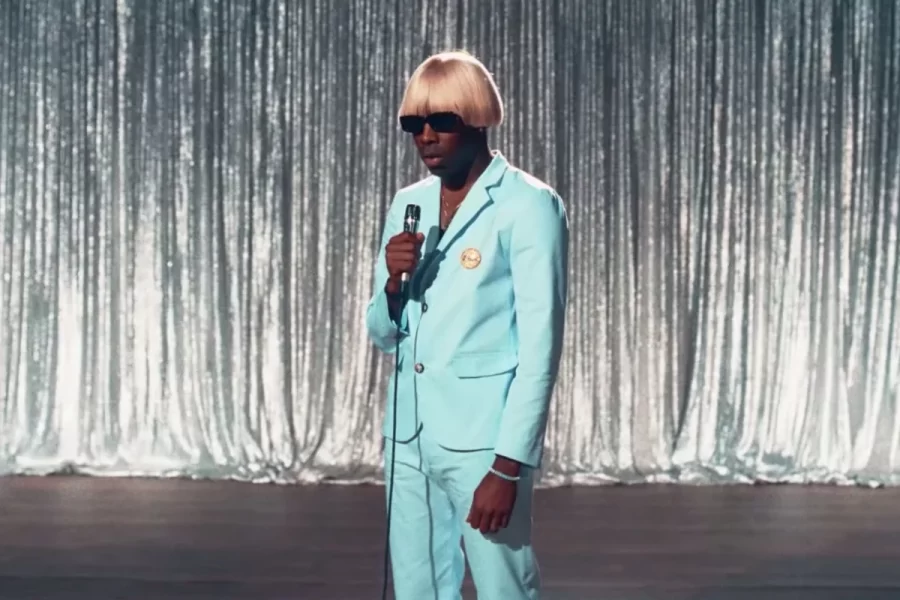Clodi explores the significance of “GONE, GONE/THANK YOU” on Igor
January 17, 2023
Heartbreak is an indescribable feeling that blends mental and physical pain into torture that one wouldn’t wish on their worst enemy. It’s been a while since heartbreak has been so accurately portrayed in the form of an album. At least as accurately as Tyler, The Creator has on his 2019 record IGOR. IGOR is an amalgamation of blaring and delightful arrangements.
“IGOR pulls elements from jazz, pop, soul, rap, electronic music, and more to create his most cohesive but unpredictable project to date.” Said The Watoto Speak.
Tyler finds peace in accepting the outcome of a relationship, creating an atmosphere full of catchy love tunes, balancing arrogance and beauty in a way that excellently captures the joy, sadness, and anger of a loving but unhealthy relationship that takes a turn for the worst.
“Gone, Gone/Thank You” by Tyler, The Creator starts with eight counts of heavy bass that gets your attention but doesn’t come back until the chorus. The instruments that can be heard were a bass, drums, vocals, piano, cowbell, and electric and acoustic guitars.” According to The Watoto Speak.
IGOR represents the best and worst of a relationship, bonded through themes of self-realization and individuality. It’s an on-the-nose portrayal of the cycle of a relationship and the heartbreak that tends to result from it, capturing everything, from the infatuation that kicks off every affinity to the hostile terms two ex-lovers find themselves on after a breakup. On IGOR, Tyler covers more than the post-breakup wallowing that we see on a majority of the songs and albums centered around heartbreak. Dwelling in one’s pain such as this is a necessary and real part of heartbreak, but Tyler takes a heartbreak album to the next level, covering not only the pain a breakup causes but also the growth that results from such a painful experience.
“GONE, GONE / THANK YOU” is an influential song to the story of IGOR. Not only is it an acceptance of letting go and saying farewell to a future with a past lover, but it questions the protagonist’s love for this person. It separates feelings from true love, stepping back, and considering that maybe they don’t truly love this person after all the ways they wronged them in the past. It takes a deep level of maturity to understand that this may be the case, but it only makes it easier to move on. Tyler’s verse here to end the “GONE, GONE” portion of the track includes a metaphor for two different blueprints of a building, accepting that everything happens for a reason and these two were on different paths that weren’t meant to cross. He also acknowledges the difficulty that comes with feeling lonely, aware of the fact that his ex is spending time with another person instead of him and he has no one: “you got your thing, I got nothing, but memories.” This causes him more torment, but he accepts that it’s okay to feel this way, and in turn, it helps him to find peace.
“You never lived in your truth, I’m just happy I lived in it / But I finally found peace, so peace”. Finding peace with the undesirable outcome of a relationship can take months, years even, but to finally find peace is such a remarkable feat for the heartbroken. This way of thinking carries into the second part of this song, the glitzy “THANK YOU”, which serves as a conclusion to the relationship, looking at it for what it was and smiling because it happened.
However, this song also expresses being understandably upset and melancholic that it’s over, and to a certain degree losing hope for the future because of how it ended. “Thank you for the love. Thank you for the joy. But I don’t want to ever wanna fall in love again. Thank you for the time. Thank you for your mind. But I’m never gonna fall in love again.” This is a reasonable feeling for one who has lost someone they were with for so long. It’s this feeling deep down that questions whether the experience was worth it. Were the love and the happiness worth the pain and suffering? Usually, immediately the answer seems to be no, but time and the right person can change that. However, nothing can change that deduction without first letting go of the past and closing that door.
Letting go is easier said than done, but is something we all have to do at some point for our own sake. Sometimes letting go can haunt us, wondering if there was something that could have led a relationship down a positive path. But other times, longing for what one had with another person is something that should be overpowered so that one can move on with their life, and leaving something behind doesn’t mean it’s forgotten.
“There were also two key changes. Both of their soundscapes are very different from the beginning. One was at the 3:56 mark, and the other at 4:36. The soundscape change at 4:36 was a dreamier sound and had more of an electric keyboard. The time signature for the song is 4/4 time and the tempo was close to presto (168-200bpm), which means extremely fast. The dynamics for the song was around mezzo forte.” According to The Watoto Speak.
I appreciate “Gone, Gone/Thank You” because of the changes Tyler, The Creator makes with each section of the song. In the beginning, he’s depressed because someone left him and he thinks all of his love is gone. In the middle, he discovers within himself why the relationship didn’t work in the first place and finds peace. In the end, he says that he is grateful “for the love and the joy” but he’s “never gonna fall in love again.”
This song touches on the last two stages of grief, which are depression and acceptance. It’s a great work of art that is well-infused with bluesy, R&B, techno, rock, rap, and alternative sounds. “Gone, Gone/Thank You” is a great example of how all genres of music overlap, and how different emotions can be expressed with a compilation of sounds that might not make sense at the time but when put together, can become true art.


